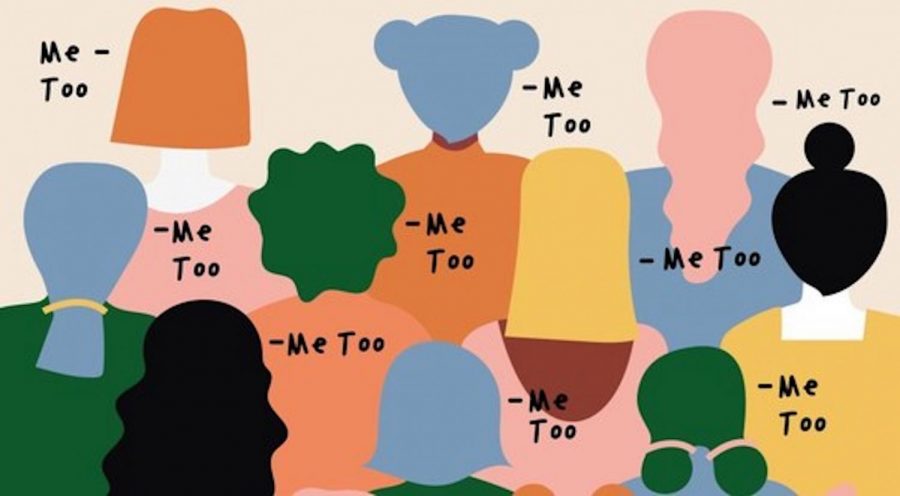The Unspoken Truth About Sexual Assault
What many don’t know about the true impact of sexual assault on Americans.
The #MeToo movement encouraged survivors of sexual violence to speak out. This article discusses how far we still have to go.
Trigger warning: Mentions of sexual assault and those emotional effects on people.
It always seems impossible, until it happens to you. As only a sophomore in high school, I already have multiple friends around my age who have experienced one form or another of sexual assault. On top of that, almost none of them reported it. Thinking it would make things worse, that nothing would happen to the person, or because no one would believe them, discouraged them from speaking out.
This was crazy to me because I had always wondered why someone wouldn’t speak up about it. If someone were to violate me like that, why wouldn’t I want them to get the punishment they deserved?
But these things aren’t as simple as I originally thought. Being someone who’s never experienced anything like that before, I have no idea what it’s actually like to be in that sort of situation. There are pretty valid reasons as to why one wouldn’t want to speak out about this.
For starters, when people I know did try to seek justice, the perpetrator was found innocent, and the victims faced doubt from their family and friends. This isn’t the case for all circumstances, but it is the unfortunate reality for many.
Already, out of all crimes, rape is the most under-reported, with only 40% of cases getting reported. Even when it is reported, the perpetrator getting convicted is not guaranteed. There is only a 50% chance of arrest, which also doesn’t guarantee prosecution, conviction, or jail time. So overall, there is only a 16% chance that the rapist will end up in prison, and when unreported rape is taken into account, only 6% of rapists ever serve a day in jail.
This alone is discouraging for victims, but taking into consideration all other reasons someone would not want to come out and talk about it, it’s not hard to see why rape is the most under-reported crime.
There is always a common fear among victims that they won’t be believed when speaking out, which unfortunately is a common situation. This shouldn’t be how others think of cases, seeing that only 2-10% of rape accusations are false. The misconception that these numbers are higher makes people less willing to talk about it, in fear of not being believed and others siding with the perpetrator.
Another reason is that the blame could be placed on the victim, but the truth is that it is never the victim’s fault. 100% of rape happens because of the rapist. Rape happens because of someone’s motive to exert and force and power over someone. No one is ever “asking for it,” and it doesn’t matter what they are wearing or how they’re acting; rape is non-consensual and has always happened no matter the circumstances.
Many times, men are wrongly ridiculed for speaking out about their experiences as being victims of sexual violence but it’s actually more common than it seems. While one in three women will experience some form of sexual violence in their lives and one in five women will be raped at some point in their lives, one in six men will experience some form of sexual violence in their lives, and 1 in 33 men have experienced rape. Just because the numbers are lower for men does not demean the significance. It is also always thought for the perpetrator to be a man, but 79% of men raped reported female perpetrators.
It is so important to acknowledge these numbers because these experiences can take a huge toll on someone’s life. Victims are 26 times more likely to use drugs, three times more likely to suffer from depression, six times more likely to suffer from PTSD, 13 times more likely to abuse alcohol, and four times more likely to contemplate suicide. All of this could further lead to self-harm, eating and sleeping disorders, affecting social relationships. Victims are also at risk of pregnancy or STIs.
Miracle Jones, a program associate for the Women and Girls Foundations and director of policy and advocacy at 1hood Media discussed with the NAEye about how her sexual trauma has affected her life.
Jones struggled with understanding that she had been violated because she was a child and did not fully understand what it meant to be a survivor or fully came to terms with it until taking a sexuality and society sociology course in college. Experiencing sexual violation as a child and date rape as an adult made her more open to communication and setting boundaries, but paranoid and distrustful of people including friends and family.
“I would always wake up when my door was opened or jump when someone came up behind me. I had to communicate requests for people not to touch me without permission which was awkward but helped me stabilize my PTSD.” Being that her interactions were not violent, she was able to engage therapy, friends, and family to process what happened.
Jones thinks that people should have access to a robust sexual education program where they are taught affirmative consent which focuses on a partner willingly saying yes instead of not saying no. “I was not aware of date rape being assault until I was well into my teens. I did not realize it could be someone they know intimately until it happened to me….Anything outside of enthusiastic consent should have people stop and pause to think about if their partner is interested and willing.”
Out of the 24 states that mandate a sex education class in public school, only eight of those states require the class to mention consent; Pennsylvania is not either of these states. A study ran by the Center for American Progress concluded that the majority of US public school students can’t identify healthy and unhealthy relationship behaviors.
The disregard for victims seen in some cases like with the US Olympic Gymnastics Team, the Catholic Church, the Boy Scouts, NCAA athletes, and more show by what extreme means people went through to cover up these scandals, valuing more their reputation or keeping a good player than bringing these important topics up and getting justice for the victims involved.
Finally, not only does this take a huge toll on victims’ psychological health, but it is an economic burden on America.
The lifetime cost of rape per victim is $122,461, which includes health and justice services. If this is multiplied by all adult (reported) rapes in the US, it is estimated to be about $3.1 trillion over all of their lifetimes, which the government is estimated to pay $1.1 trillion for.
We cannot keep ignoring this just because it’s an uncomfortable topic or not the “ideal” conversation. This needs to be brought up and prevented, because why is this epidemic still overtaking the country? At this point and time in history, shouldn’t we have learned about consent by now? Where is parenting or our education systems failing?
Although it hasn’t happened to me, the harsh reality is that it probably will.
When are we going to learn that no means no?
Harassment is a behavior characterized by unwelcome and inappropriate sexual remarks or physical advances in a workplace or other professional or social situation. (Ex. catcalling)
Assault refers to sexual contact or behavior that occurs without the explicit consent of the victim.
Rape is unlawful sexual intercourse carried out forcibly, against a person’s will, or incapable of valid consent.
The 24 hour National Sexual Assault Hotline is 1-800-656-4673. Visit the RAINN website for more information and resources.
The 24 hour Pittsburgh Action Against Rape Hotline is 1-866-363-7273. Visit the PAAR website for more information and resources.

Dani Benavides is a sophomore at NAI. This is her first year writing for NAEye, and she moved to Pittsburgh a year ago from Utah. She likes watching basketball,...




Lamees Subeir • Apr 13, 2020 at 9:02 pm
Dani, this is an amazing article and this topic needs to be talked about more. Thank you for writing this.
Marissa Granite • Mar 11, 2020 at 5:01 pm
Another great piece Dani!!
Sally • Mar 11, 2020 at 1:54 pm
Very thought-provoking, Dani.